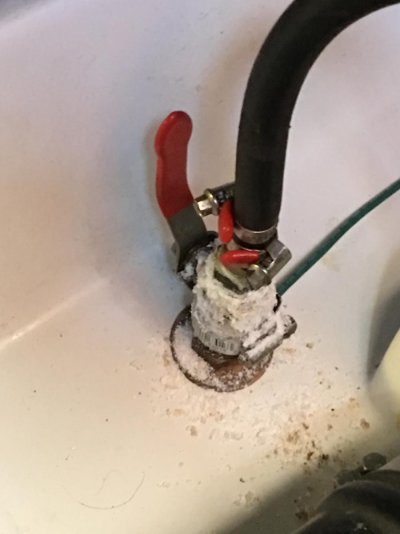Update: As reported we thoroughly cleaned and treated the thru-hulls, inspected them at a haul out, tied them to a ground. Our suspicion was that Marina Del Rey was hotter. We were using 220v AC at the slip, that there was some stray currents at the marina etc, etc, etc. However, within 8 weeks of doing the repairs and back in our home port (pic attached) the same thing happened.
To Beneteau's credit, after I sent them pics on Tuesday, within an hour their Sr Service advisor from Annapolis called. We discussed the situation and he is arriving in the Bay Area to be on the boat this Monday to trouble shoot.
Please stand by.
CeeBee:
It's encouraging to hear Beneteau has been responsive.
I've been doggedly attempting to debunk the "hot marina" myth for years, and did so when this theory was first put forth. To some extent your experience bears out the fallacy of this myth, marinas aren't "hot", boats are. While AC shore power connections may facilitate galvanic corrosion, via the green safety ground, AC power, from a marina's mains or anywhere else, does not, with very rare exceptions and often where aluminum is concerned, cause stray current corrosion. Corrosion is virtually always a DC phenomenon, either via stray current, i.e. from a battery, or galvanic, from dissimilar metals.
While you issue may have been exacerbated by a malfunctioning or absent galvanic isolator, nearby vessels whose anodes are depleted, or a deteriorated bonding system, those are likely red herrings in this analysis, they do not represent the root of the problem.
Irrespective of the hot marina issue, in your initial post you noted/showed photos of the metal in these fittings, which had turned pink in locations. If so, this means it contains zinc, and that's almost certainly the cause of the problem.
Alloys that contain more than 15% zinc (this is brass by definition and even 15% is too much IMO) should not be used for underwater and raw water plumbing (such seacocks and fittings would
not meet UL 1121, and thus lack ABYC H-27 compliance). Using it and relying on the vessel's bonding system to protect these metals from corrosion and dezincification is shear folly. Once the zinc anodes are depleted, the next least noble metal, the zinc-bearing plumbing fittings, will begin to corrode. That "formula" is typical of all bonding system arrangements, however, through hull fittings and seacocks known to contain this level of zinc are far more susceptible to corrosion than those that contain little or no zinc; they should, therefore, not be used.
From an article on the subject...
"ANSI/UL 1121.8.1 The components of a through-hull fitting or sea valve shall be formed of galvanically compatible materials having the strength and resistance to corrosion necessary to withstand intended and abnormal use to which they are likely to be subjected.
ANSI/UL 1121.8.3 A part made of drawn brass or machined from brass rod containing more than 15 percent zinc shall be subjected to the 10-Day Moist Ammonia-Air Stress Cracking Test."
What's Below Your Waterline? - Seaworthy Magazine - BoatUS
The only exception to the zinc-bearing alloy rule is fittings that are embossed DZR, which stands for dezincification resistant. From the same article...
"Unfortunately, a huge range of alloys lies between true bronze with very little or no zinc and true brass which contains a high percentage of zinc. Two common alloys often used in marine applications are 85-5-5-5 and DZR. 85-5-5-5 contains 85 percent copper, 5 percent zinc, 5 percent lead and 5 percent silicon and can be used below the waterline. Some European manufacturers use something called DZR brass, a dezincification-resistant brass alloy. This alloy has a higher zinc composition than many other copper alloys (30 percent or more), but it also includes trace amounts of other metals meant to retard zinc corrosion or leaching. The more zinc an alloy contains, the more prone it is to dezincification, therefore, alloys with little or no zinc content are more desirable, and typically more costly. Accordingly they can be an attractive, though inferior, alternative for cost-conscious builders or do-it-yourselfers."
The fittings used in your seacock installation do not appear to be of the DZR variety, and even if they were they are clearly not working as they are dezincifying.
The only lasting solution, IMO, is to replace them with seacocks, metallic or non-metallic, that meet ABYC H-27/UL 1121 (both the hardware and the installation). Such compliant seacocks are clearly labeled by their manufacturers.


 Is "posted" a euphemism for something else?
Is "posted" a euphemism for something else? 

